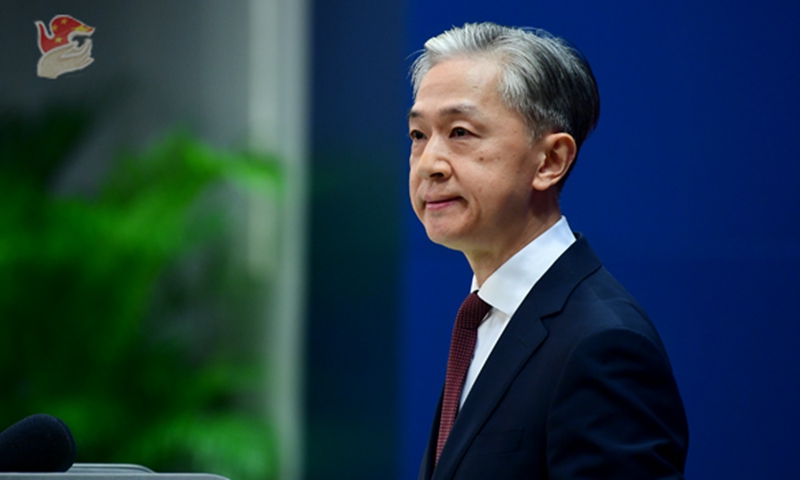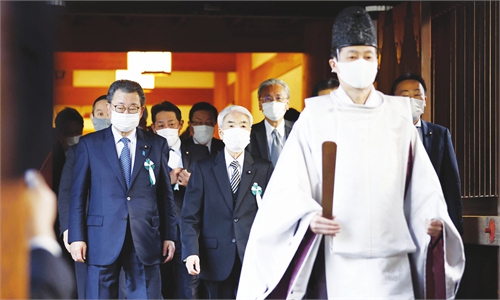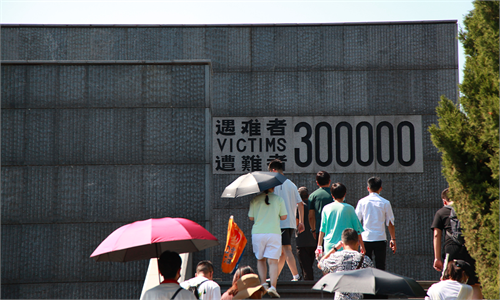Chinese FM urges Japan to make a clean break with militarism after Kishida sends offering to Yasukuni Shrine

Foreign Ministry Spokesperson Wang Wenbin Photo: Chinese Foreign Ministry
China's Foreign Ministry (FM) on Monday voiced strong opposition to Japan and urged Tokyo to own up to its commitments on facing squarely its history of aggression and make a clean break with militarism, after Japanese Prime Minister Fumio Kishida reportedly sent a ritual offering to the notorious Yasukuni Shrine, widely seen as a symbol of Japan's militaristic past.
Kishida on Monday sent the "masakaki" ceremonial tree on the occasion of the shrine's autumn festival, but is likely to refrain from paying a visit during the two-day festival, Japan's Kyodo News reported on Monday.
Japanese Economic Security Minister Takaichi Sanae, who had paid a visit to the shrine in August and drew a backlash from neighboring China and South Korea, visited the shrine again on Monday, according to Kyodo News.
The Yasukuni Shrine enshrines Japan's infamous Class-A war criminals who symbolized Japan's war atrocities and militarism during World War II.
China firmly rejects Japan's negative moves concerning the Yasukuni Shrine and has lodged solemn démarches to the Japanese side, Wang Wenbin, a spokesperson for China's FM, said at a regular press conference on Monday.
"We urge the Japanese side to earnestly own up to its statements and commitments on facing squarely and reflecting on its history of aggression, make a clean break with militarism and win the trust of its Asian neighbors and the larger international community through concrete actions," Wang said.
South Korea also voiced deep regret on Monday over Kishida's ritual offering to the shrine. The South Korean government "expresses deep disappointment and regret" that Japan's "responsible" leaders have once again sent offerings, or paid respects, to the Yasukuni Shrine, Lim Soo-suk, spokesperson for the Seoul foreign ministry, said in a statement, Yonhap News reported.
Since former Japanese prime minister Shinzo Abe's Yasukuni visit in December 2013 prompted outrage from China and South Korea and also disappointed Japan's key ally the US, Abe and his successors, Yoshihide Suga and Kishida, have avoided visiting the infamous shrine while in office. But they have adopted a more subtle approach of paying tribute to the shrine by sending offerings, so as to cater to the right-wing forces in the country, said Lü Chao, an expert at the Liaoning Academy of Social Sciences.
"This exposed the fact that many Japanese politicians still do not admit Japan's history of militarist aggression," Lü told the Global Times on Monday.
Honoring criminals from World War II in any way showed a stubbornness by Japanese leaders in refusing to face up to the mistakes, which hurts the feelings of Asian people, especially the Chinese people and people on the Korean Peninsula, the expert said.
Rising right-wing forces in Japan are pushing the country into militarism by either glorifying the war or refusing to admit the war was an act of aggression, which will surely trigger other Asian countries' antipathy toward it, Lü said.
Instead of reflecting on its own wrongdoings, Japan is going astray by seeking to revise its pacifist constitution and boosting its military expenditure, and also tagging along with the US to create more threats to regional security.
Experts warned that a Japan that sticks to historical revisionism will continue to be viewed as "non grata" by its neighboring countries, and its ties with those countries are unlikely to be mended.


